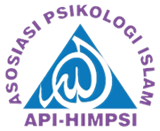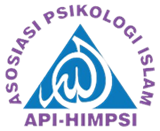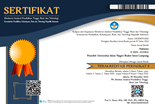Epistemic Curiosity as a Predictor of Psychological Well-Being: A Correlational Analysis
Abstract
The advancement of knowledge and the abundance of information can trigger confusion, information fatigue, and uncertainty that have an impact on an individual's psychological well-being. This study has three hypotheses, with one main hypothesis being to test the relationship between epistemic curiosity and psychological well-being. There are two remaining hypotheses testing the dimensions of epistemic curiosity on psychological well-being. This study uses a quantitative correlational approach with two instruments: epistemic curiosity and psychological well-being. The participants obtained were 376 students who were taken using convenience sampling and snowball sampling techniques. The results of this study did not find a significant relationship between epistemic curiosity and psychological well-being. However, Deprivation-Type Curiosity as a dimension of psychological well-being was not proven to be substantial for psychological well-being. In other words, a high level of curiosity can have positive or negative impacts, depending on the various factors that influence it. Therefore, it is important to investigate mediating or moderating variables in subsequent studies.
Keywords: epistemic curiosity, psychological well-being, correlational study, mental health
Full Text:
PDFReferences
Creswell, J. W. (2014). Research Design: Qualitative, Quantitative, and Mixed Methods Approaches. Thousand Oaks, CA: Sage.
Diener, E., Emmons, R. A., Larsen, R. J., & Griffin, S. (1985). The satisfaction with life scale. Journal of Personality Assessment, 49(1), 71-75. https://doi.org/10.1207/s15327752jpa4901_13
Dunning, D. (2011). The Dunning–Kruger effect: On being ignorant of one’s own ignorance. Advances in Experimental Social Psychology, 44, 247-296. https://doi.org/10.1016/B978-0-12-385522-0.00005-6
Field, A. (2018). Discovering Statistics Using IBM SPSS Statistics (5th ed.). London: SAGE Publications.
Kang, M., Kim, J., & Kim, S. (2009). The role of epistemic curiosity in learning. Educational Psychology Review, 21(1), 79-88. https://doi.org/10.1007/s10648-008-9080-0
Litman, J. A. (2005). Curiosity and the pleasures of learning: Wanting and liking new information. Cognition and Emotion, 19(6), 793-814. https://doi.org/10.1080/02699930541000101
Litman, J. A. (2008). Interest and deprivation factors of epistemic curiosity. Personality and Individual Differences, 44(7), 1585–1595. https://doi.org/10.1016/j.paid.2008.01.014
Litman, J. A., & Spielberger, C. D. (2003). Measuring epistemic curiosity and its diversive and specific components. Journal of Personality Assessment, 80(1), 75-86. https://doi.org/10.1207/S15327752JPA8001_16
Loewenstein, G. (1994). The psychology of curiosity: A review and reinterpretation. Psychological Bulletin, 116(1), 75-98. https://doi.org/10.1037/0033-2909.116.1.75
Maslach, C., Schaufeli, W. B., & Leiter, M. P. (2001). Job burnout. Annual Review of Psychology, 52(1), 397–422. https://doi.org/10.1146/annurev.psych.52.1.397
Nugroho, H., Wibisono, S., & Nuryana, Z. (2020). Hoax di Indonesia: Perspektif psikologi sosial. Jurnal Psikologi Sosial, 18(2), 175-185.
Open Science Collaboration. (2015). Estimating the reproducibility of psychological science. Science, 349(6251), aac4716. https://doi.org/10.1126/science.aac4716
Pascal, B. (2003). Pensees (A. J. Krailsheimer, Trans.). Penguin Books. (Original work published 1670)
Silvia, P. J. (2006). Exploring the psychology of interest. Oxford University Press.
Wahyuni, F. E., & Riyanto, S. (2018). Hubungan antara beban akademik dengan kesejahteraan subjektif mahasiswa. Jurnal Psikologi Pendidikan dan Konseling, 4(1), 12-21.
DOI: http://dx.doi.org/10.24042/ajp.v8i1.26215
Refbacks
- There are currently no refbacks.
Copyright (c) 2025 M. Choirul Ibad, Linda Mora, Cempaka Putrie Dimala













